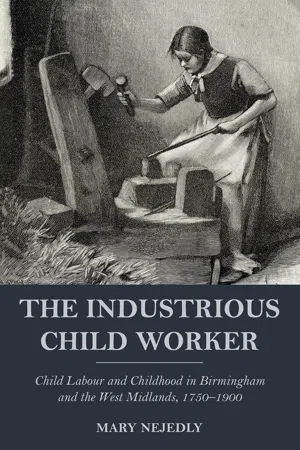
eBook - ePub
The Industrious Child Worker
Child Labour and Childhood in Birmingham and the West Midlands, 1750 - 1900
- 256 pages
- English
- ePUB (mobile friendly)
- Available on iOS & Android
eBook - ePub
The Industrious Child Worker
Child Labour and Childhood in Birmingham and the West Midlands, 1750 - 1900
About this book
Studies of child labour have examined the experiences of child workers in agriculture, mining and textile mills, yet surprisingly little research has focused on child labour in manufacturing towns. This book investigates the extent and nature of child labour in Birmingham and the West Midlands, from the mid-eighteenth century to the end of the nineteenth century. It considers the economic contributions of child workers under the age of 14 and the impact of early work on their health and education. Child labour in the region was not a short-lived stage of the early Industrial Revolution but an integral part of industry throughout the nineteenth century. Parents regarded their children as potentially valuable contributors to the family economy, encouraging families to migrate from rural areas so that their children could work from an early age in the manufacture of pins, nails, buttons, glass, locks and guns as well as tin-plating, carpet-weaving, brass-casting and other industries. The demand for young workers in Birmingham was greater than that for adults; in Mary Nejedly's detailed analysis the importance of children's earnings to the family economy becomes clear, as well as the role played by child workers in industrialisation itself. In view of the economic benefit of children's labour to families as well as employers, both children's education and health could and did suffer. As well as working at harmful processes that produced dangerous fumes and dust or exposed them to poisonous substances, children also suffered injuries in the workplace, mainly to the head, eyes and fingers, and were often subjected to ill-treatment from adult workers. The wide gulf in economic circumstances that existed between the families of skilled workers and those of unskilled workers, unemployed workers or single-parent families also becomes evident. Attitudes towards childhood changed over the course of the period, however, with a greater emphasis being placed on the role of education for all children as a means of reducing pauperism and dependence on the poor rate. Concerns about health also gradually emerged, together with laws to limit work for children both by age and hours worked. Mary Nejedly's clear-eyed research sheds fresh light on the life of working children and increases our knowledge of an important aspect of social and economic history.
Frequently asked questions
Yes, you can cancel anytime from the Subscription tab in your account settings on the Perlego website. Your subscription will stay active until the end of your current billing period. Learn how to cancel your subscription.
No, books cannot be downloaded as external files, such as PDFs, for use outside of Perlego. However, you can download books within the Perlego app for offline reading on mobile or tablet. Learn more here.
Perlego offers two plans: Essential and Complete
- Essential is ideal for learners and professionals who enjoy exploring a wide range of subjects. Access the Essential Library with 800,000+ trusted titles and best-sellers across business, personal growth, and the humanities. Includes unlimited reading time and Standard Read Aloud voice.
- Complete: Perfect for advanced learners and researchers needing full, unrestricted access. Unlock 1.4M+ books across hundreds of subjects, including academic and specialized titles. The Complete Plan also includes advanced features like Premium Read Aloud and Research Assistant.
We are an online textbook subscription service, where you can get access to an entire online library for less than the price of a single book per month. With over 1 million books across 1000+ topics, we’ve got you covered! Learn more here.
Look out for the read-aloud symbol on your next book to see if you can listen to it. The read-aloud tool reads text aloud for you, highlighting the text as it is being read. You can pause it, speed it up and slow it down. Learn more here.
Yes! You can use the Perlego app on both iOS or Android devices to read anytime, anywhere — even offline. Perfect for commutes or when you’re on the go.
Please note we cannot support devices running on iOS 13 and Android 7 or earlier. Learn more about using the app.
Please note we cannot support devices running on iOS 13 and Android 7 or earlier. Learn more about using the app.
Yes, you can access The Industrious Child Worker by Mary Nejedly in PDF and/or ePUB format, as well as other popular books in History & Modern British History. We have over one million books available in our catalogue for you to explore.
Information
Table of contents
- Cover
- Title Page
- Copyright
- Contents
- List of illustrations
- Abbreviations
- Acknowledgements
- 1. Introduction
- 2. Parish apprentices and the old Poor Law
- 3. Birmingham workhouse children
- 4. The industrious child worker
- 5. Child labour and the family economy
- 6. Education, industrialisation and child labour
- 7. The health and ill-health of child workers
- 8. Set adrift: Birmingham’s child migrants
- 9. Childhood redefined
- 10. Conclusion
- Appendix
- Bibliography